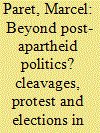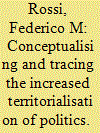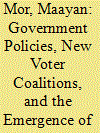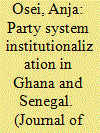|
|
|
Sort Order |
|
|
|
Items / Page
|
|
|
|
|
|
|
| Srl | Item |
| 1 |
ID:
160682


|
|
|
|
|
| Summary/Abstract |
Declining electoral support for South Africa's ruling party, the African National Congress (ANC), suggests a potential weakening of the anti-apartheid nationalism that defined the immediate post-apartheid period. Using two surveys of voters in primarily poor and working-class black areas, conducted during the 2014 (national) and 2016 (local) elections, as well as three case studies of protest by workers, poor communities and students, this article examines the social cleavages and political dynamics that underpinned deepening political competition. Results show that voting decisions varied according to gender, age, ethnicity and receipt of welfare benefits. Different public provisions mattered most during national versus local elections, demonstrating that voters paid close attention to government operations. Underscoring political fluidity, some instances of protest reinforced ANC dominance while others fed into support for the opposition. The findings challenge notions of uncontested one party dominance, revealing instead that some poor black voters are critically evaluating the ANC's performance and developing oppositional political identities.
|
|
|
|
|
|
|
|
|
|
|
|
|
|
|
|
| 2 |
ID:
165081


|
|
|
|
|
| Summary/Abstract |
The territorialisation of politics is a crucial transformation in state–society relations that has implications on how contemporary politics works. Defined here as the dispute for the physical control of space, be it a municipality, province or portion of land, within one or more politically constituted entities. It does not mean the emergence of a new regime type, but the process through which the territory re-emerges as a new cleavage after neoliberal reforms and authoritarian regimes have weakened/dissolved neo-corporatist arrangements for the resolution of socio-political conflicts in society. It is a cleavage because central political divisions are produced as a result of the physical encounter of or distance between political actors and of the dispute for the control of a territory for sociopolitical goals and causes that are not always territorially defined. Departing from this definition, I also raise potential explanatory hypotheses for the transformations that favoured this transformation in Argentina.
|
|
|
|
|
|
|
|
|
|
|
|
|
|
|
|
| 3 |
ID:
099280


|
|
|
| 4 |
ID:
184996


|
|
|
|
|
| Summary/Abstract |
Conventional theories of ethnic politics argue that political entrepreneurs form ethnic parties where there is ethnic diversity. Yet empirical research finds that diversity is a weak predictor for the success of ethnic parties. When does ethnicity become a major element of party competition? Scholars have explained the emergence of an ethnic dimension in party systems as the result of institutions, mass organizations, and elite initiatives. But these factors can evolve in response to an emerging ethnic coalition of voters. The author advances a new theory: ethnic cleavages emerge when voters seek to form a parliamentary opposition to government policies that create grievances along ethnic identities. The theory is tested on rare cases of government policies in Prussia between 1848 and 1874 that aggrieved Catholics but were not based on existing policies or initiated by entrepreneurs to encourage ethnic competition. Using process tracing, case comparisons, and statistical analysis of electoral returns, the author shows that Catholics voted together when aggrieved by policies, regardless of the actions of political entrepreneurs. In contrast, when policies were neutral to Catholics, the Catholic party dissolved.
|
|
|
|
|
|
|
|
|
|
|
|
|
|
|
|
| 5 |
ID:
127760


|
|
|
|
|
| Publication |
2013.
|
| Summary/Abstract |
This paper presents a comparative case study of party system institutionalization in Ghana and Senegal. Both countries experienced a democratic change in government in the year 2000, but while positive development has continued in Ghana, democratic quality in Senegal decreased over time. Can the concept of party institutionalization help to explain this diverging development? Four dimensions of party system institutionalization are systematically compared: regularity, social roots, legitimacy, and party organization. It is found that party competition in Ghana is characterized by high stability and a low number of parties. The major parties are organized throughout the country and have definable support bases with deep historical roots. They give orientation to voters and are perceived as legitimate actors. In Senegal, in contrast, the party system is fluid and less predictable. Parties are not structured along social cleavages and many of them are weakly organized and highly personalistic. In summary, the case studies support the assumption that an institutionalized, well-structured party system in which relevant social cleavages are translated into electoral alternatives is positively related to democratic quality.
|
|
|
|
|
|
|
|
|
|
|
|
|
|
|
|
|
|
|
|
|